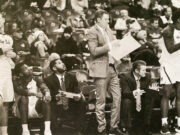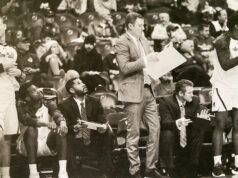by Miguel Humara, Ph.D.
Last year I went to watch my cousin’s 13 year-old boy play for the championship of his soccer league. Tom’s a pretty good soccer player and I was surprised to hear him say as we drove to the field that he didn’t know if he was going to play the following year. I couldn’t believe my ears. I remembered how excited he had been when he made the team at the beginning of the season. This was Tom’s first year playing on his local select team and he had always loved the sport. All you had to do was take one look at his room filled with his youth trophies and medals, walls covered with soccer posters, and a green rug with the design of a soccer field and you just knew this. What could make him want to quit? Not surprisingly he told me that he thought that the coach was too hard on him and the other players. “It’s like we can’t do anything right,” Tom said softly. The fact that they were in the championship game was proof that they had done some things right.
Unfortunately, my nephew’s story is all too common. While the physical and emotional benefits of sports are undeniable, a significant drop out rate in youth sports has emerged. By age 12, 75% of boys and 65% of girls will quit the sport of soccer. Similar statistics exist for other organized sports as well. When children quit playing they are missing out on a valuable opportunity for physical and emotional health. Organized sports provide a forum to learn valuable life skills including goal-setting, acceptance of criticism, and team-work.
So who is to blame for this? Just like with my nephew, the suspect is all too often the coach. One study found that the top two reasons children cited for quitting organized sports were that it was no longer fun or interesting. The individual who should be held accountable for this is the coach. Many people underestimate the influence that a coach can have on child athletes. Some people have gone so far as to say that the influence of a coach is second only to that of a parent – more so in cases where a child has lost a parent or when there is marital conflict in the home.
When I asked my cousin what he thought about his son quitting the sport and the perhaps over bearing coach, he answered, “I don’t know what to do, I’ve tried to talking to the guy (coach) but it’s like it goes in one ear and out the other.” This is a fairly common problem that many parents experience – how do you deal with an emotionally abusive coach. I don’t think that there is a single parent that would allow their child to be physically abused by a coach, so emotional abuse shouldn’t be any different. What can be done to deal with an abusive coach?
Preventing the Problem
The easiest way to deal with an abusive coach is to not allow him or her from coming into contact with our children. Simply put, stop the problem before it occurs. To do this, you need to do some self-examination and research.
First and foremost, ask yourself the reasons why you want your child to play organized sports. The answer for most people will be the physical and emotional benefits of competition. However, some people live under the delusion that they have a little super-star in their home. Given the odds against making it to the professional level, it is simply not realistic to think that this will happen. If your child is indeed truly gifted, this will emerge. However, if you push too hard, you are becoming just like the emotionally abusive individuals that you are trying to protect your child from. The purpose of playing sports should be enjoyment. The instant that this is no longer true, the sport becomes a chore.
Parents need to take time and be proactive. Just like you took the time to find out what schools are best for your child, you should take the time to find out what teams – and by extension, coaches – are best. Ask your friends, neighbors, and even teachers if they’ve heard of any good coaches. Perhaps the most important thing that you can find out about the coach is their style. Don’t just go by his or her win-loss record from the previous season. Talk to them yourself and find out which of the following three styles they use:
- Command style coaches make all the decisions and the young athlete is supposed to simply respond to orders. While they are often successful in terms of winning, this type of coach tends to make their athletes want to quit because of their tendency to push too hard and to disregard input from the athletes.
- Submissive coaches make as few decisions as possible which can result in a great deal of chaos. This coaching style is often unsuccessful in terms of winning as well as retaining kids in the sport. Some kids on the team may become overly domineering and critical of others which can result in your child losing interest.
- Cooperative coaches recognize their role as the team leader but share some of the decision making with athletes. This is easily the best type of coach for your child. While they provide a great deal of structure, they do so in a healthy way.
You should ask questions about the coach’s specific expectations, such as: practice attendance, season goals, selection of team captains, and game participation by team members. If possible, ask if you can watch a practice. Watch how they interact with the players. Do they vary the drills that they use to keep kids interested? Do the kids experience more success then failure? Do they praise the athletes either verbally or non-verbally? Do they talk to all the kids or do they play favorites? The goal should be enjoyment not just winning – do they communicate this and model it as well? These are simple things that will go a long way towards figuring out what style they use and what your child’s level of enjoyment will be.
Dealing with the Problem
Sometimes, despite your best efforts, your child will come into contact with an individual who is abusive. This is a problem that is not going to simply go away. You need to confront it. But how? You follow the chain of command:
The first step is to speak with the coach directly. If the situation permits, speak with him informally and individually. A group of parents is more likely to put the individual on the defensive. As human beings, it is quite natural to not listen to the content of a message when we are defensive. This is particularly true when dealing with an individual who is used to being in charge. Meet with the coach after practice or a game and discuss your concerns calmly. Try not to take an accusatory tone or he may become defensive. Let him know about your own parenting style and what you have found motivates your child to persevere. Perhaps, the coach is not aware of his or her behavior. Let them know how much your son values the sport and playing on the team. Finally, give the coach a chance to change the behavior that concerns you. It may even be necessary to have a second talk. You should compliment the positive changes that the coach has made but reiterate your concerns.
If after you have spoken with the coach, the behavior does not change you need to go to his/her superior. This may be the principal or the director of the house league. Telephone the individual and state your concerns clearly and calmly. The coach may be more likely to respond to a discussion about the behaviors that are of concern from a superior. However, you should remember that these are busy people and they will appreciate your earlier attempts to resolve the problem; so be sure to mention your attempt(s) to rectify the situation informally.
Should the problem persist, it may be necessary to remove your child from the team. If this is the case, you should definitely file a formal complaint with the school or other administrative body. Unfortunately, this will do very little to help your child, but could be valuable in the future. Behavior patterns are very stable over time, and it is likely that the coach will continue with his behavior. While one complaint may not be grounds for dismissal, a repeated pattern of behavior is. It is especially important to talk to your child about why you are pulling him/her off the team and that they are not the one at fault. Put it in language that they can understand. Try using phrases like “It’s not your fault” or “You’ll do better on another team.” It’s a shame if it comes to this since he’s not responsible for the coach’s behavior. While he may resist the idea initially in the long run it will be more damaging to him to remain with an abusive individual. Finally, try to get them involved with another team. The benefits of organized sports are too numerous to allow a bad experience with a coach to keep them from competing.
Conclusion
The coaching style that an individual uses can result in either a positive or negative experience for an athlete. Unfortunately, many coaches have lost sight that the purpose of organized sports is enjoyment and effort, not just simply winning at all costs. The best way to deal with this problem is to stop it before it happens. If it does occur, you should follow the chain of command and discuss your concerns. Simply pulling your child off the team is not going to benefit anyone – especially your child. There are simply too many positive things to be gained from playing in organized sports.













